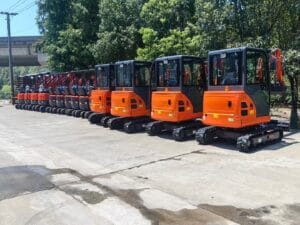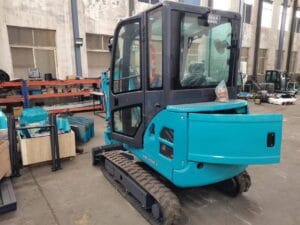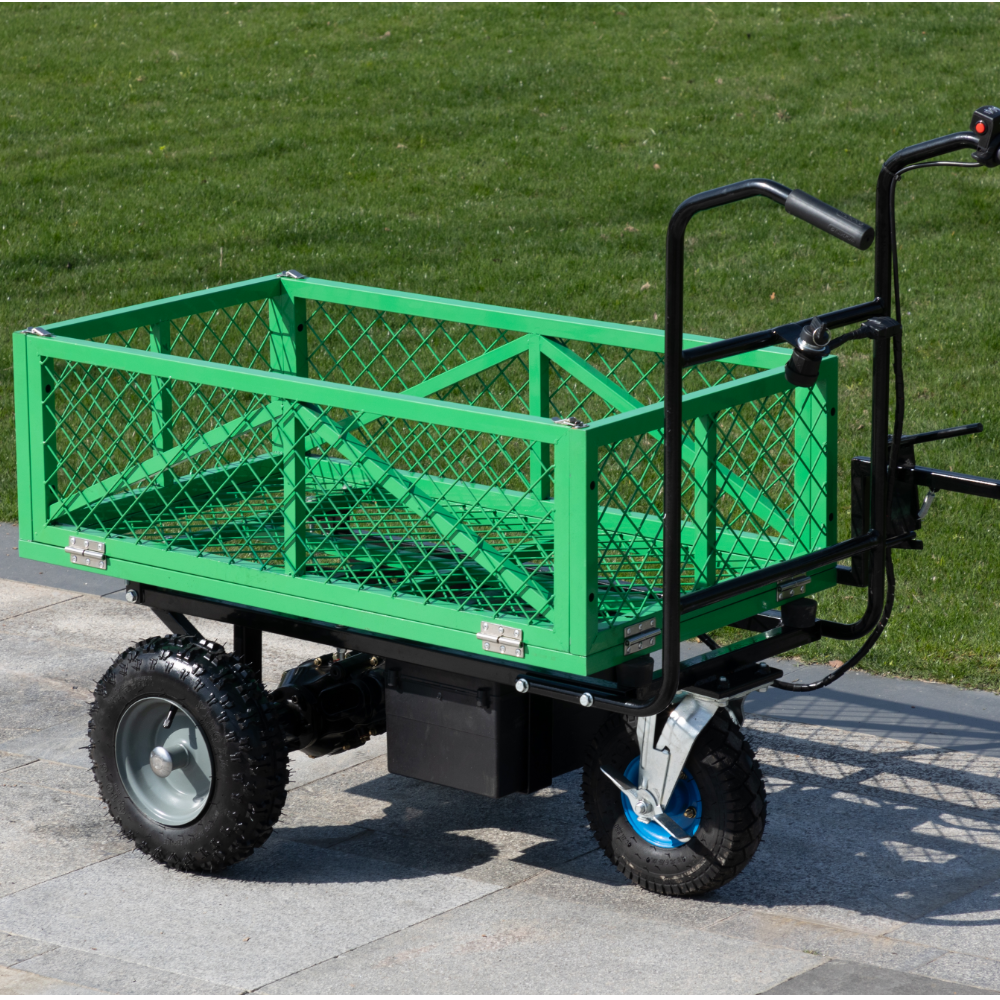The difference between a mini excavator and a regular excavator
Mini excavators, also known as compact excavators, are much smaller and lighter than regular excavators. You can see the differences between the two most obviously regarding size, weight, and where you can use them. Regular excavators are built for heavy-duty projects.
They are large, powerful, and designed for big construction sites that require strength, high digging depth, and lifting power. These machines are common in mining, highway construction, bridges, and demolition projects. Because of their size, they require more space to operate and stronger ground support.
Mini excavators, on the other hand, are designed with flexibility and maneuverability in mind. They are small enough to fit in places where bigger machines cannot go. Yet, they are strong enough to do jobs like digging, trenching, lifting, and grading.
Their compact size makes them easier to transport, reduces damage to surrounding surfaces, and helps operators save on fuel consumption. Modern mini excavators are smaller in size but still have strong hydraulics. They can do many of the same jobs as larger excavators, just on a smaller scale.
Different industries benefit from mini excavators in unique ways. In city construction, they are often used for tasks like installing underground utilities, preparing foundations, or making landscape designs. Their ability to maneuver through narrow streets or small plots of land makes them ideal for city projects. Farmers also use mini excavators for irrigation projects, digging drainage ditches, building fencing lines, or preparing small land areas for crops.
Utility companies gain from using them to dig trenches for cables or pipelines. They can also fix underground systems without disturbing large areas. Homeowners and independent contractors use mini excavators for personal projects. They dig swimming pools, remove tree stumps, and prepare yards for construction.
Ningbo ACE Machinery Co., Ltd., a professional manufacturer with 29 years of experience, provides both mini excavators and essential excavator parts. The company focuses on designing compact excavator attachments and mini excavator buckets that meet international standards. Its research and development team works with experienced engineers to create durable, high-performance machines.

Analysing the application advantages of excavators and mini excavators.
Mini excavators are easy to move, cost less, and work well in tight spaces. Regular excavators offer more power, dig deeper, and lift heavier loads for large projects. Mini excavators save fuel and reduce damage to surfaces, while regular excavators deliver unmatched capacity for demanding tasks.
Ease of use and application of mini excavators. Maintenance
Mini excavators are designed to be simple to use and easy to maintain. Operators can learn the controls quickly, and only basic care is needed for long-term reliable use. Regular maintenance such as checking fluids, cleaning filters, and inspecting excavator parts helps extend their life.
How much does a mini excavator weigh?
Mini excavators vary in weight depending on the model and its purpose. Most models weigh between 1 ton and 10 tons. The smallest models, called micro excavators, can weigh less than 2 tons and are often used for indoor construction or small residential projects. They are easy to transport and ideal for work where space is extremely limited.
Medium-sized mini excavators, weighing between 3 and 6 tons, are the most popular choice for contractors. They are heavy enough to handle trenching, digging, and light construction but still compact enough for easy transport. Larger mini excavators, weighing between 7 and 10 tons, deliver more digging depth and lifting capacity while still being smaller than full-sized machines.
Weight is an important factor in transport and performance. Smaller excavators can be moved using trailers, while larger ones may need trucks. The machine’s ground pressure also matters. Lighter excavators are less likely to damage delicate surfaces such as lawns, pavements, or landscaped areas.
Contractors should also consider the effect of attachments, since heavy mini excavator buckets or hydraulic compact excavator attachments increase overall weight. Choosing the right weight ensures safe transport and effective operation for different projects.

How much is it to rent a mini excavator?
Mini excavator rental is a practical choice for many businesses and homeowners. Renting allows customers to use the machine only when they need it, avoiding the cost of ownership and maintenance. Prices usually range from $150 per day for small units to $500 or more per day for larger machines. Weekly rentals are often between $1,200 and $1,500, while monthly rentals may cost $2,500 to $4,000.
Longer rental terms often come with discounted rates, making them cost-effective for bigger projects. Seasonal businesses also benefit, since they can rent machines only during busy months.
Many rental suppliers provide additional services, such as renting mini excavator buckets, grading blades, or augers. Renting with attachments allows more flexibility and expands the range of tasks the excavator can complete. Customers can negotiate deals that include transport and insurance, reducing extra expenses. Renting is also useful for customers who want to test machines before buying, giving them confidence in their investment decisions.
How to operate a mini excavator?
Operating a mini excavator is easier than many people think. Most models use joystick controls for moving the boom, arm, and bucket. Pedals or levers are used to drive the tracks forward, backward, or for turning. Before operating, users should check fluid levels, inspect excavator parts, and make sure compact excavator attachments are secure.
New operators should practice with basic movements, such as lifting and lowering the boom or scooping with the bucket. Smooth and steady movements are best for both safety and efficiency. Safety gear such as helmets, gloves, and boots should always be used.
Mini excavators are lighter and smaller than standard excavators, so they are easier to learn. This makes them a good choice for both professionals and beginners.
Conclusion
Mini excavators combine compact size, strong performance, and cost savings, making them valuable across industries worldwide.





